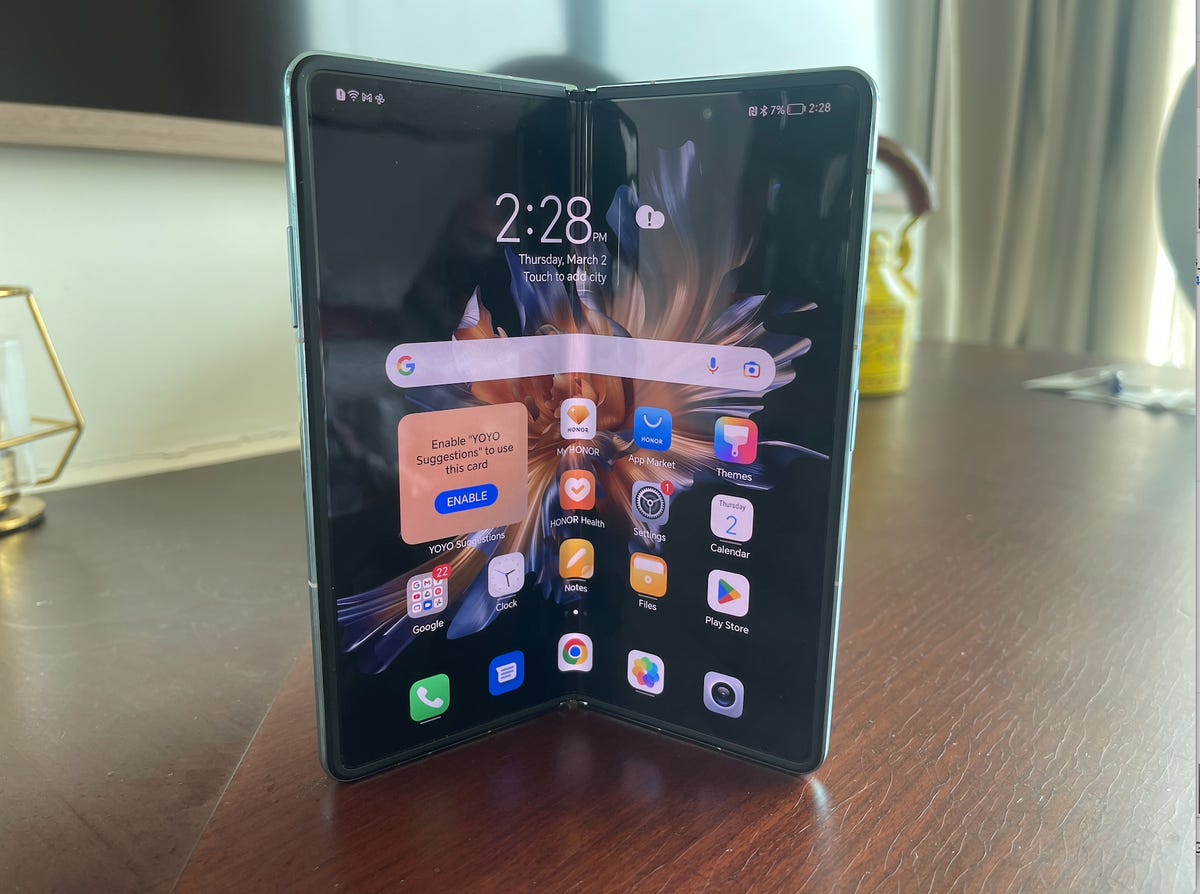
Samsung finally has a new rival in the foldable phone ring: The Magic Vs foldable from Honor, formerly owned by Huawei. Honor revealed in September that it would bring its Honor Vs to international markets after a China release. This week, it showed off its book-style foldable flagship designed for a global audience at the Mobile World Congress in Barcelona.
I had the chance to test the Honor Magic Vs a few days before its launch. I was impressed with the device’s slick hardware, which is lightweight but also allowed the two halves of the phone to fold flat against each other without a gap. The Galaxy Z Fold 4, its biggest rival, still has a wedge-shaped gap when closed even in its newest iteration.
Beyond the standout features, the Honor Magic Vs packs all the specs you’d expect from a 2023 flagship phone into a slick package. That includes a large battery (5,000 mAh), fast charging (66 watts), a powerful Snapdragon 8 Gen Plus 1 processor, and three years of OS upgrades as well as five years of security patches. The only knock I could give in terms of specs is that it lacks the newer Snapdragon 8 Gen 2 chip found in the Galaxy S23 line and OnePlus 11.
Like
- Lightweight for a foldable
- Fantastic battery life
- Fast charging
Don’t Like
- Software doesn’t take nearly enough advantage of the fold
- No official IP rating
- Crease could be less obvious
- Less software updates than Galaxy Z Fold 4
However, it’s not perfect. The crease is more visible and discernible to the touch than other book-style foldables I’ve tested, such as the Oppo Find N and the Huawei Mate XS 2. The phone also lacks wireless charging and an official IP rating for water- and dust-resistance. By comparison, the Galaxy Z Fold 4 has an IPX8 rating for water-resistance.
That said, the Magic Vs starting price undercuts the Galaxy Z Fold 4 by 200 euros, and you also get more storage for that lower price. The Magic Vs starts at 1,599 euros for 12GB RAM and 512GB storage. By comparison, the Galaxy Z Fold 4 starts at 1,799 euros for 12GB RAM and 256GB of storage. There are no current plans for a US release, although the company said a UK launch is expected in June.

Honor wants the Vs to be a first-class phone first, and a tablet second. The inner screen has a 90Hz display, while the cover screen has a 120Hz display.
Sareena Dayaram/CNET
Honor Magic Vs outer display is the focus
The Magic Vs’ headline feature is its bendable display. Like the Galaxy Z Fold 4, it has a cover screen and an interior screen. The outer screen measures 6.45 inches diagonally, while the inner display is 7.9 inches. I found both crisp, responsive and bright, and each screen also folds into the other with no discernible gap.
Unlike Samsung, Honor chose to equip the cover screen of its book-style foldable with superior specs. For example, it has better brightness (1,200 nits vs. 800 nits) and a higher refresh rate (120Hz vs. the inner screen’s 90Hz). For reference, the Magic Vs’ inner screen is a step below the 120Hz capability of the Galaxy Z Fold 4.
Considering this is a foldable phone, I found Honor’s choice to be counterintuitive at first. However, it seems Honor wants this device to be a phone first, and a tablet second. I think this decision helped prolong the battery life of the Honor Magic Vs — which, by the way, was fantastic. (More on that below.)
Honor Magic Vs inner display has an obvious crease
Honor says the Magic Vs has a creaseless display, but that didn’t turn out to be true. You can see and feel the inner display’s crease from various angles. It was immediately noticeable as soon as I opened the phone. I didn’t have to search for it as I have with other foldable phones, such as the Oppo Find N or the Huawei Mate XS 2.
Despite the crease, watching movies and flipping through pictures is fun and immersive. While it didn’t bother me much, such a large crease may be a deal-breaker for some. But it’s a compromise that fans of foldables may just have to learn to live with for now. Samsung’s Galaxy Z Fold 4 still has a crease, though it’s less noticeable than in the past. But Huawei’s Mate XS 2, which has a wraparound-style foldable phone design with one screen, is basically creaseless.
Key to the folding nature of this phone is the hinge. The company said the hinge is crafted with an aerospace grade polymeric material and has fewer components in its supporting structure (just four compared to 94). This helps make the hinge lighter and potentially more durable. Honor claims the hinge can withstand up to 400,000 folds, which means you can expect maybe 10 years of use out of it if you assume 100 folds per day. CNET hasn’t been able to independently verify that claim.
Honor Magic Vs camera
The Honor Magic Vs has three rear cameras, consisting of a 54-megapixel main camera, 50-megapixel ultrawide camera, and an 8-megapixel telephoto camera capable of 3x optical zoom. There’s also a 16-megapixel selfie camera, which is one less front-facing camera than the pricier Galaxy Z Fold 4.
Overall, I was happy with photo clarity, dynamic range, shutter speed and the versatility of the camera. Whether I was in bright, dim or even dark lighting environments, the camera captured crisp, vibrant and accurate photos in a variety of lighting scenarios. That said, this isn’t the best camera. It doesn’t measure up to the iPhone 14 Pro Max for instance, which tends to offer better low light photography. But I guess that’s OK (sort of) since you’re really paying for that fancy display, not the camera module.

This photo was taken through a window. The Honor Vs managed to capture a color accurate image with solid dynamic range.
Sareena Dayaram/CNET

10x zoom example.
Sareena Dayaram/CNET

30x zoom example. This image is relatively lacking in image noise considering how far the camera was zoomed in.
Sareena Dayaram/CNET

This setting was a tricky one to capture since the indoor environment was dim and there was bright light pouring through the windows. Despite this challenge, the camera captured a sharp image with crisp details indoors. Notice the detailing on the wooden floor and the bar seats.
Sareena Dayaram/CNET

The camera does a good job capturing the environment inside the window as well as outside.
Sareena Dayaram/CNET

Notice the sharp detailing of the plate and the contrasts in this photo. It was taken indoors.
Sareena Dayaram/CNET

I took this photo in a moving taxi and think it did a good job capturing motion.
Sareena Dayaram/CNET
Honor Magic Vs battery performance
With a 5,000-mAh battery, the Honor Magic Vs has the largest battery of any commercially sold foldable phone. Non-foldable phones, such as the Galaxy S22 Ultra and the Galaxy S23 Ultra, have the same battery capacity.
The Magic Vs made it through most days of testing on a single charge with medium use. I didn’t need to bother charging at the end of the day since I usually had more than 20% remaining. But I charged overnight anyway out of habit.
When I ran a battery endurance test where I watched YouTube videos, scrolled through my Instagram feed, played Genshin Impact and took a 5-minute WhatAapp video call on the cover screen. The battery went from 100% to 86% in those 45 minutes.
The Magic Vs comes with a bundled 66-watt charger, which Honor says will completely replenish a dead battery within 46 minutes. Based on my experience, that claim was true, which means the Magic Vs outshines the Galaxy Z Fold 4 in this department.
The Magic Vs runs on 2022’s Snapdragon 8 Plus Gen 1. In my short time with this phone, the device performed without a hitch whether it was powering multiple apps, running games, streaming YouTube videos or even just switching between apps.

The Magic Vs propped up in a laptop-like position.
Sareena Dayaram/CNET
Honor Magic Vs software
The Magic Vs runs Android 13 and Honor’s MagicOS. I’m a fan of MagicOS’ split-screen multi-tasking system, which includes a slide-over menu that you trigger by swiping and holding from the sides. You can multitask with up to four applications, and there’s a split screen mode as well as floating windows. You can also move apps around and resize their windows.
It’s a shame the software doesn’t take enough advantage of the phone’s folding design. I would have loved to see something like Samsung’s Flex mode on the Magic Vs. Even though I could use the phone when it was half-folded and prop it up like a laptop, none of the apps I used, even native ones, that were tailored for that experience. The Galaxy Z Fold 4’s Flex Mode software capabilities let you use the screen when it’s folded at a 90-degree angle.
With the Magic Vs’ slender hardware, solid cameras, fabulous battery life and intuitive multitasking features, Honor has created a solid rival to the Galaxy Z Fold 4. But it’s still tough to recommend the Magic Vs over the Galaxy Z Fold 4 for several reasons: There’s no IP rating, the crease is more visible, its software doesn’t really take advantage of the folding screen and Honor provides fewer software updates than Samsung. Honor made a solid first effort overall, though, and I’m so glad Samsung has more competition.
For more details on how the Magic Vs and the Galaxy Z Fold 4 compare, take a look at CNET’s specs chart below.
Honor Magic Vs specs vs. Galaxy Z Fold 4
| Honor Magic Vs | Galaxy Z Fold 4 5G | |
|---|---|---|
| Display size, resolution, refresh rate | Internal: 7.9 inches, 90Hz (2,272×1,984 pixels) External: 6.45 inches, 120Hz (2,560×1,080 pixels) | Internal: 7.6 inches (2,176×1,812 pixels) External: 6.2 inches HD+ (2,316×904 pixels) |
| Pixel density | Internal: 381 ppi External: 431 ppi | TBC |
| Dimensions (Millimeters) | Folded: 160.3×72.6×12. 9 mm; Unfolded: 160.3×141.5×6.1 mm | Folded: 67.1×155.1×15.8 mm (Hinge) ~ 14.2mm (Sagging); Unfolded: 130.1×155.1×6.3 mm |
| Weight (Ounces, Grams) | 9.23 oz, 261g (orange); 9.42 oz, 267g (black & cyan) | 9.27 oz; 263g |
| Mobile software | Android 13 | Android 13 |
| Camera | 54-megapixel (main), 50-megapixel (ultrawide), 8-megapixel (telephoto with 3x optical zoom) | 50-megapixel (main), 12-megapixel (ultrawide), 10-megapixel (telephoto) |
| Front-facing camera | 16-megapixels | 4-megapixel (under display), 10-megapixel (front cover) |
| Video capture | 4K | 4K |
| Processor | Snapdragon 8 Gen Plus 1 | Snapdragon 8 Gen Plus 1 |
| Storage/RAM | 12GB + 512GB | 12GB + 256GB/512GB/1TB |
| Expandable storage | None | None |
| Battery/Charger | 5,000 mAh | 4,400mAh |
| Fingerprint sensor | Side | Side |
| Connector | USB-C | USB-C |
| Headphone jack | None | None |
| Special features | Foldable phone, 3x optical zoom, 66-watt bundled fast-charger | Foldable phone, 30x optical, 30x space zoom, IPX8, 25-watt fast-charging (no in-box charger) |
| Price (USD) | $1,695 (coverted) | $1,800 (256 GB) |
| Price (GBP) | £1,420 (converted) | £1,649 (256GB) |
| Price (Euros) | 1,599 euros (12GB RAM + 512GB) | 1,799 euros (256GB) |
